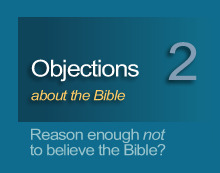WHY THIS?
The Bible is credited as having originated with God, but having been penned by human beings. So who is it we are ultimately trusting??
For we will all stand before God's judgment seat. It is written: " 'As surely as I live,' says the Lord, 'every knee will bow before me; every tongue will confess to God.' "
So then, each of us will give an account of himself to God.
- Romans 14:10b-12
For prophecy never had its origin in the will of man, but men spoke from God as they were carried along by the Holy Spirit.
- 2 Peter 1:21
"We're not really being asked to trust God, but asked to trust the human authors of the Bible."
RESPONSE:
'...And human authors can't be trusted, therefore the Bible can't be trusted', or so it might be reasoned. Sounds like logic at first, but consider if, out of similar distrust, I deleted the next five emails authored by a co-worker who "claims" to be writing at the direction of the boss. I might end up coming to you looking for a job. It is indeed an important question: Just who are we trusting, and how do we trust them?
First, think about this: what do we not trust human authors to do? To always tell the truth. I'm okay with that.
But is it possible that everything a person authors is false? No, because that can be demonstrated. It is possible for a person to author something that is true. Therefore it is possible for a human writing to be trustworthy.
Second, if a person truthfully authored that which God instructed and enabled them to author (inspire in the biblical sense), then God's intended words and the author's resulting words would be the same. In a sense, trusting one is trusting the other; distrusting one is distrusting the other.
As an illustration, let's say one of those work emails I trashed claimed to be "The Ten Tasks" I'm always to be doing. Knowing the author is only human like myself, I can reason that he or she likely failed to perfectly quote the CEO and inaccurately conveyed the boss's words. Who knows if those really were the CEO's words, or even if there is a CEO. Then one day the CEO introduces herself to me and inquires about how I'm doing on those tasks. I respond, "Is there anything I should be doing?" By responding that way, what have I just done?
I've just confessed that I'm either: 1) not doing anything, or 2) that I don't know or aren't sure of what I'm doing, or 3) that I didn't believe her when she said to do it, or 4) that I didn't believe she had really commissioned those Ten Tasks.
For you non-business people out there, none of these are going to be good for my future. Nor will it alleviate my guilt to start challenging the legitimacy of the CEO's position or qualifications, or start bashing the email's author - her confidant and friend.
The boss is email savvy. She knows that I opened the email which she empowered someone to write. This boss knows what they wrote, and saw to it that everyone got the word one way or another. When I distrusted the email, I effectively distrusted the boss. Whether or not the email was sufficiently convincing by my personal standards doesn't matter - only doing what it said is what counts. You can guess how happily this illustration ends in the business world, and I assure you that, too, is how it ends in the spiritual world.
Perhaps to all this you reasonably respond, "Maybe trusting the human authors under a certain condition is the same as trusting God, but how do I know if a given writing is actually coming from the Big Boss?" Excellent question, and equally answerable. In short, it will exhibit qualities that are summarily labeled inspired.
Regardless from whom writing claims to have come, you might ask an equally important question: "Is whatever I'm being told true?" For if it isn't, it isn't from the God of the Bible, nor does it matter what human author you're being asked to trust. Concerning the Bible's truthfulness, the Veracity and Integrity sections have many questions that may be of interest to you.
See also:
What is inspiration?
What is truth?
Isn't one interpretation just as good as the next?



Expanded!